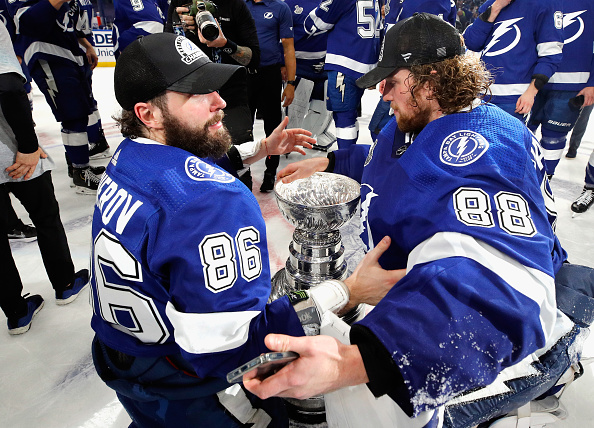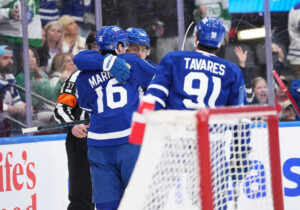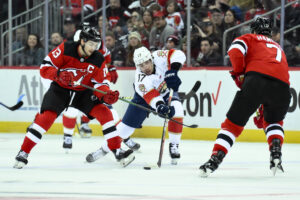Let’s talk playoff pool strategy. In all honesty, this article could be three words long: there isn’t any. That’s only because most poolies prepare for the playoffs with the wrong information. Regular season stats don’t matter. Head-to-head records don’t matter. Game one of the playoffs is the ultimate reset. Remember that.
Playoff Pool Strategy
The Bracket
When the National Hockey League changed the format of the Stanley Cup Playoffs to include two wild card teams for the 2013-2014 season, they changed the strategy behind playoff pools. The ability to map out your bracket essentially makes it easier to plan which teams will face each other and pick your teams and/or players accordingly. Picking the winner is no easy task. There are easily 10 teams this season that are capable of going the distance. Don’t be afraid to go with who you like and stick with it. The Tampa Bay Lightning finished eighth overall in points last season before defending their crown.
The Players
Formats for playoff pools vary widely. Some allow for picks between rounds and others have you picking one team before the post-season and sticking with it throughout. The latter would obviously require more strategy. It’s important to play the long game and not be shortsighted with your selections. A team that includes Connor McDavid, Auston Matthews, Nikita Kucherov, Johnny Gaudreau, Gabriel Landeskog and Kirill Kaprizov looks great on paper, but it’s impossible to get all six players through two rounds. You might be the leader after round one or two, but your team will eventually fizzle out after losing high picks early on. Pick players from the teams you think will go far in the playoffs. Map out your bracket and keep your selections to the final four. Selecting from just two or three is a little riskier but will reap higher rewards. In most pools, assuming you’re at least 50% correct, this strategy will give you a good chance to win.
[pickup_prop id=”22631″]
Then comes the playoff pool strategy behind your actual player selections. Being a “playoff performer” is a real thing. Some players are just better when the pressure is on. For example, the regular season would suggest that Steven Stamkos be picked before Brayden Point. However, Point’s playoff statistics are better. If you like the Lightning to go far, consider picking a player from another team until Stamkos is selected and then pick Point. Below is a deeper look at some of the players you can think about choosing or avoiding altogether.
The Duds
McDavid is without a doubt the number one pick in regular season fantasy drafts next season. Playoff pools are a different beast. Just because he’s the best player in the league doesn’t mean he’s the best pick for postseason drafts. McDavid led the league last season with an incredible 105 points in 56 games and yet, he and the Oilers got swept in the first round. Edmonton scored eight goals in four games and McDavid only had one goal and four points.
He is worth mentioning only because of his incredible production, but there are far worse underachievers than him that will be hoping to play starring roles when the dance begins on May 2nd. At the top of the list is arguably the best line in the NHL this season. Johnny Gaudreau, Matthew Tkachuk and Elias Lindholm. They have combined for .53 points per game in the postseason. Toronto Maple Leafs stars Mitch Marner, Matthews and John Tavares have also had a lack of recent playoff success that is well documented.
Other notables who have historically disappointed in the postseason include: Kevin Fiala (12 points in 29 playoff games), Roope Hintz (21 points in 38 playoff games), Mika Zibanejad (19 points in 31 playoff games), John Carlson (68 points in 117 playoff games), Roman Josi (40 points in 81 playoff games), Bryan Rust (27 points in 72 playoff games), Vincent Trocheck (six points in 19 playoff games), Phillip Danault (nine points in 38 playoff games), David Perron (48 points in 92 playoff game) and Brayden Schenn (32 points in 63 playoff games).
The Studs
On the flip side, there are players that elevate their game when the stakes are highest. Over the last two seasons that eventually concluded in the Tampa Bay Lightning hoisting the Stanley Cup, Point combined for 106 points in 120 regular season games. That’s a point per game of 0.88. Over both playoff runs he averaged a point per game of 1.22. Or how about Nathan MacKinnon? MacKinnon leads all active players with a 1.38 points per game in the playoffs. He has 69 points in 50 games played.
Of course, most of the time studs are going to be studs. It’s the players that play out of their “norm” and raise their game where you can find value. Some of those players are: Ryan O’Reilly (44 points in 52 playoff games), Jamie Benn (49 points in 59 playoff games), Gabriel Landeskog (45 points in 49 playoff games), Jason Spezza (five points in his last seven playoff games), Nazem Kadri (29 points in 36 playoff games) and Miro Heiskanen (30 points in 40 playoff games).






